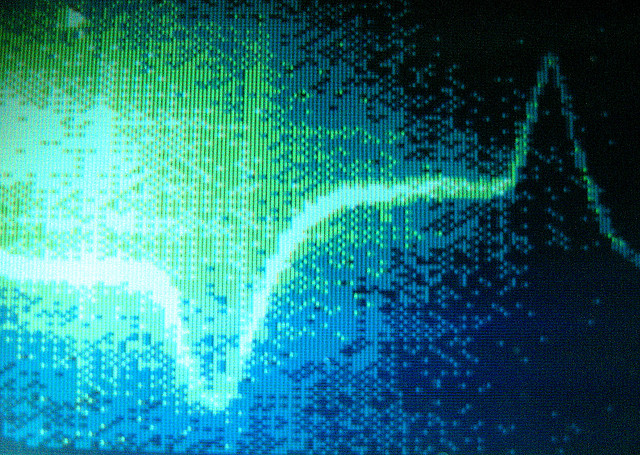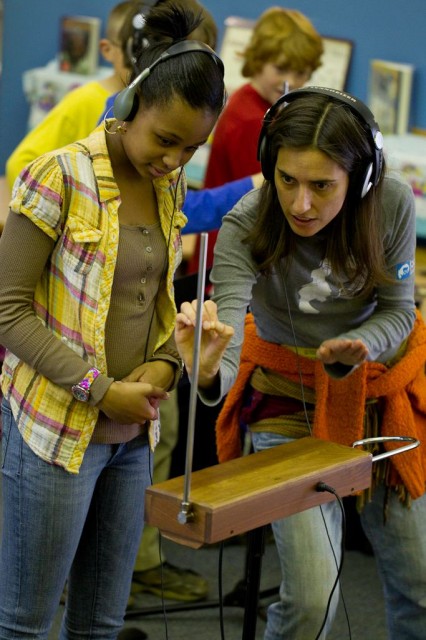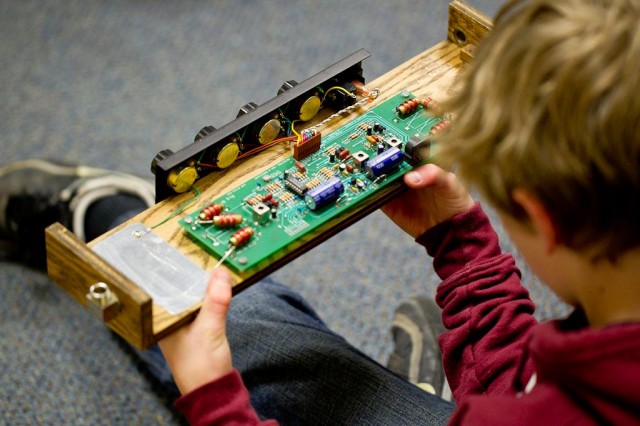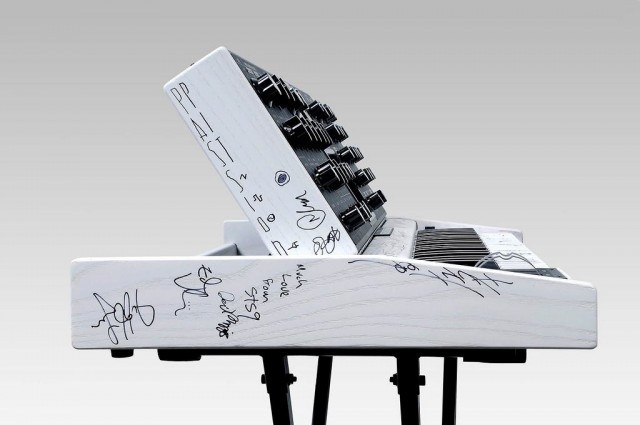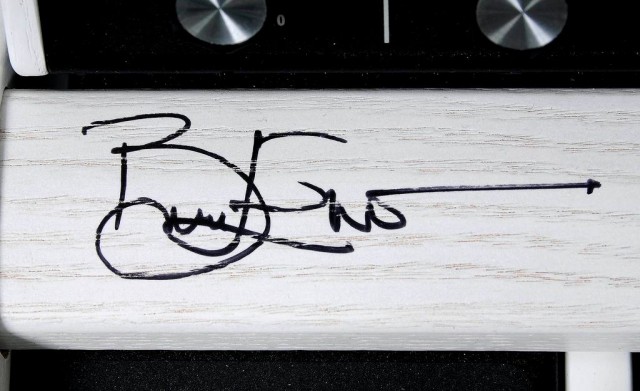We’re here today not just because people like synths, or electronic music, or even music itself, but because the advancement of technology depends on kids learning about science and math.
That was certainly the history of Bob Moog himself. What he got as a student opened up the doors to the knowledge and interests that gave the world Moog synthesizers. Dr. Moog himself long credited his education – as a youngster at Bronx High School of Science in New York City, studying physics at Queens College, Colombia, and Cornell, and even making kit Theremins and discovering electronics – for what would come. Look to any other synth pioneer, or modern inventor or software developer, and you’ll find a similar story.
That’s not to say we need to turn the entire population of the planet into synth builders. But what music technologists do inspires science just as science inspires music. A lot of the young boys and girls who played with Theremins – or, later, Moog synths – went on to advancements in everything from space exploration to medicine. People accomplished amazing things motivated in part by the politics of the Cold War. Imagine what we could do motivated by the desire to do new things – and make new sounds.
All of this makes the mission of the Moog Foundation vitally important. Led by Bob Moog’s daughter Michelle and an elite crack team of synth experts, they’ve already begun reaching kids in schools around Asheville, North Carolina and Jamaica. They’re using synths as a window into science and physics. (Waves underly huge amounts of the universe, and it’s tough to find a better way to understand those waves than playing an electronic musical instrument.)
A funding drive to take this local project national is about to run out of time, and it’s well short of its funding goal. So now’s a great time to look at the project and consider giving even a small amount of support.
You’ve got only a little time left: at the end of Thursday March 1, just before midnight, Eastern time, this fund drive is over.
There are two important things you should know.
First, the Moog Foundation is not associated with Moog Music, the private company started by Bob that makes products like the Voyager and Moogerfooger. The Moog Foundation is entirely independent, and not-for-profit. Science (science!), not selling Moogs, is their mission, and they’re driven by your support – not sales of gear.
Second, since it’s awesome to get swag along with your feelings of good will and acheivement, yes, we’re going public TV/radio fund drive here and telling you that you’re going to get some excellent stuff to commemerate your contribution and fill your studio (or the bumper of your car, if you’ve got one) with synth love.
Marc Doty, who has been involved with developing the curriculum, tells CDM more. (Marc is known recently in these parts when, in a bizarre instance of devil’s advocate, I wound up advocating analog synths and knobs and he iPad apps, all leading to some good discussion and I thought some nice insights.) He explains the mission of the project, and details the curriculum:
Bob Moog pursued his passion for musical instruments through his talent for electronics. As a result, his work changed the landscape of electronic music history, music history, and even history in general. The application of his creativity and innovation has resulted in tools and knowledge that inspired thousands from multiple generations.
It is the belief of the Bob Moog Foundation that the spirit of creativity and innovation evinced by Bob Moog has the power to continue to inspire; not just in regard to music, musical instruments, or electronics, but also in regard to creativity and innovation in general. We live in a time where unique and inspired approaches to problem solving make the difference between mediocrity and brilliance, and where a fresh outlook has the power to revolutionize thinking. Just like Bob’s work inspired a revolution in thinking.
Bob was an educator, so what better way to spread his legacy than through education?
Doctor Bob’s SoundSchool is a curriculum designed to portray the science of sound through the magic of music. It was authored in 2011 by a variety of skilled professionals who had been inspired by the work of Bob Moog, and is the result of their combined knowledge, talents, experiences, and inspiration. It focuses on the physics of sound, and delivers scientific content in an innovative and inspiring way consistent with aspects of Bob’s pursuits, as well as consistent with successful educational practice.
At the core of the curriculum is “The Wiggle.” The Wiggle is a creative way to portray the nature and behavior of sound which can be effectively and accurately demonstrated without simplification or generalization to students of all ages. The focus of the curriculum is the portrayal of the life cycle of the wiggle; how sound is generated, how it interacts with its environment, how it travels, how it is changed, and how it is perceived.
The curriculum is divided into 7 different sections; 5 of which address the nature and life cycle of The Wiggle. Using a variety of tools and media (including tuning forks, oscillators, and even real theremins!), the nature of sound is explored and revealed. The way sound is generated, the way it moves through various media, how it can be converted into electronic form, and how it it can be observed and measured are all covered in detail and in creative and compelling ways which are consistent with the multiple various learning styles of students.
One aspect of the curriculum is the “chain of sound.” This is a fun and creative set of cards which portrays sound in various ways from its origin to its perception that can be arranged in multiple configurations to portray the life cycle of the sound wave. Students can employ creative thinking in their arrangement of the cards, and the rules of arrangement help students understand the physical behavior of sound.
Currently, the curriculum is being implemented in Asheville City Schools at the 2nd grade level, which is the age at which the state standards suggest that the physics of sound should be introduced. This implementation is a test run where we fine tune our efforts through a process of measurement in regard to the effectiveness of the curriculum.
We are currently engaged in an Indiegogo campaign which will hopefully fund our efforts to expand Dr. Bob’s SoundSchool nationwide.
Marc Doty
Archive and Education SpecialistP.S. People still bring up our little interchange about the Animoog. It has been the source of a variety of interesting conversations! Thank you for that opportunity! 🙂
Thanks, Marc.
Among the prizes, pictured here: a Moog Voyager Select Series Synthesizer signed by Moog-inspired artists including Brian Eno, Moby, Wayne Coyne, Edgar Froese, Passion Pit, Chromeo, Ghostland Obervatory and many other bands who performed at Moogfest 2011. The Moog Foundation says donors can also win a VIP weekend for two to Moogfest 2012 featuring a stay at the breathtaking Grove Park Inn Resort & Spa in Asheville, NC and a pair of VIP tickets to Moogfest 2012.
But those nice bonuses aside, I think it’s worth noting that the entire impetus for the project came out of an outpouring of letters and support following Bob Moog’s death. It’s something we saw at CDM, and it’s fantastic to see out of what was initially grief, something new blossoming.
More information:
http://www.indiegogo.com/Bob-Moog-Foundation-Dr-Bobs-SoundSchool
www.moogfoundation.org
Photo gallery of Moogfest Voyager: http://bit.ly/wYY9mZ
Twitter: https://twitter.com/#!/MoogFoundation
Facebook: http://www.facebook.com/BobMoogFoundation
And to see this in action, don’t miss:
Pilot Program of Dr. Bob’s SoundSchool Begins
